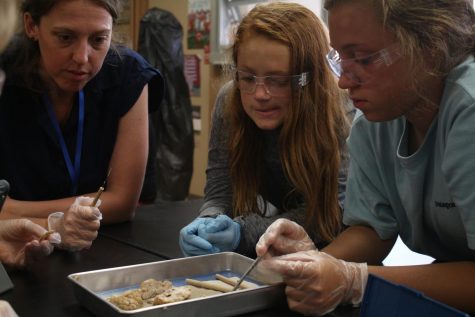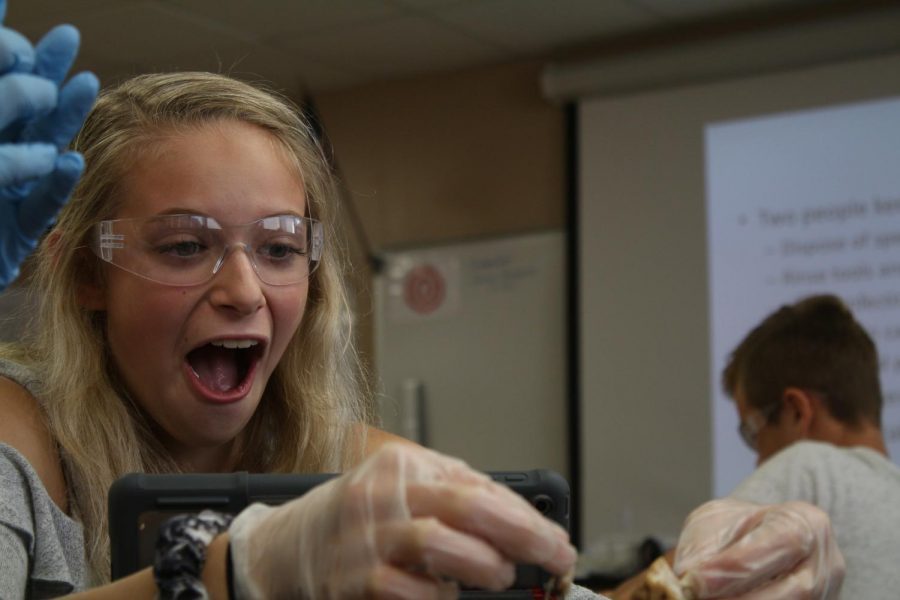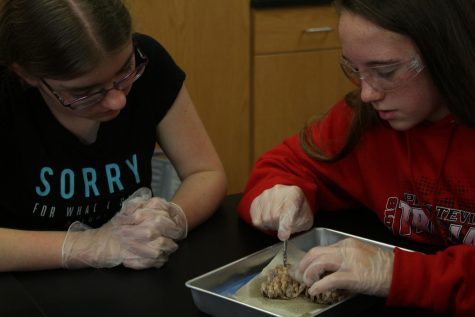Baa! Students Dissect Sheep Brains with Psychologist
Students get excited about dissecting sheep brains.
September 26, 2018
On Friday, September 14, 2018, Dr. Angela AuBuchon – a Boys Town researcher with a PhD in cognitive psychology – led seventh and ninth grade students (under Mrs. Clayton and Mr. Dutcher respectively) in a sheep’s brain dissection lab. The sheep brains were donated by a Platteview Central parent.
Dr. Aubuchon runs her own lab at Boys Town in Omaha, where she studies how children’s brains develop, learn, and think. Dr. Aubuchon has taught psychology at University of Missouri, Columbia and Indiana University, Bloomington. With such experiences teaching university students in mind, Dr. AuBuchon commented that the PHS and PC students brought a liveliness and energy to the activity: “[The students] were so focused and so interested on looking at the sheep brains that sometimes they got really excited and it was hard to bring it back.” Dr. Aubuchon said she led the sheep brain lab because “I love science and I love neuroanatomy and just want to share that with anyone,” as well as an opportunity for young women to “see women in science who love their jobs,” and finally, “to share with the Omaha community that we have research in hearing, and language, that we [research] more than just behavioral disorders.”

Dr. Angela AuBuchon works at Boys Town National Research Hospital.
Freshman biology student Richard Ellsworth said the sheep brain lab was “pretty interesting. [There is a] huge difference between a sheep brain and a human one.” Dr. Aubuchon explained that sheep brains were used because animals vary in their brains, and some have different perks, like how cat brains have better eyesight structures, but sheep brains are similarly structured to ours and easier to obtain.
Dr. AuBuchon’s highlight of the day? She replied that “The highlight was I had a really good question from a young women [who asked] ‘What is this structure?’, and that structure happens to be the thalamus, and it’s a very important structure in the brain.” Furthermore, Dr. AuBuchon reflected the importance for middle school and high school students to see women professionals in science careers – as teachers, professors, researchers, and scientists.
Additionally, this is not the first time students at Platteview have enjoyed a visit from Dr. Aubuchon; she was at Platteview last year talking about the eclipse, perception, the eyeball, and how light is damaging to the eye. She commented that she looks forward to working with Platteview students in the future on similar science labs and projects.


Margaret Lion • Oct 8, 2018 at 12:38 pm
Oh well done! This looks like a lot of fun.